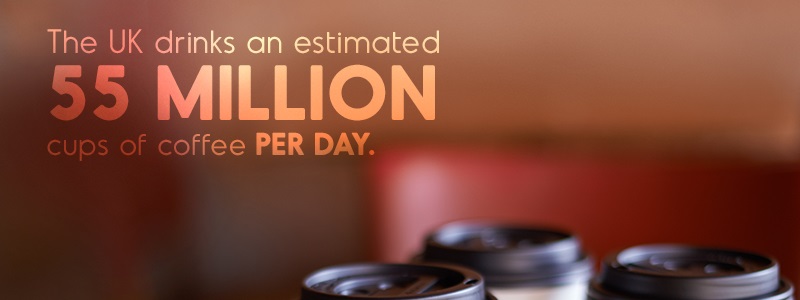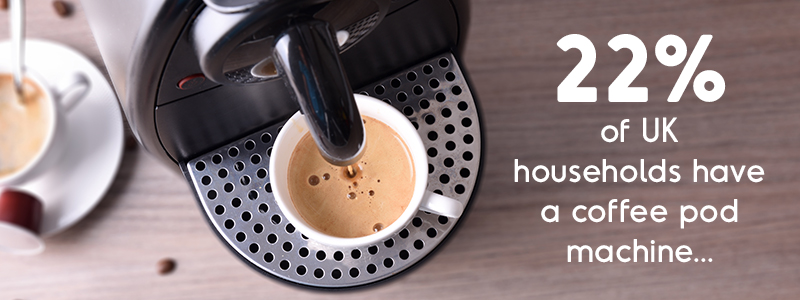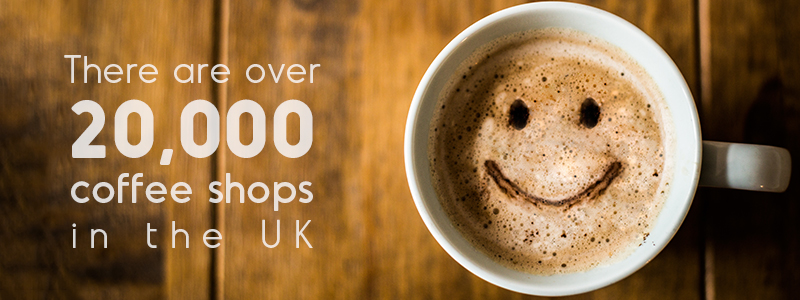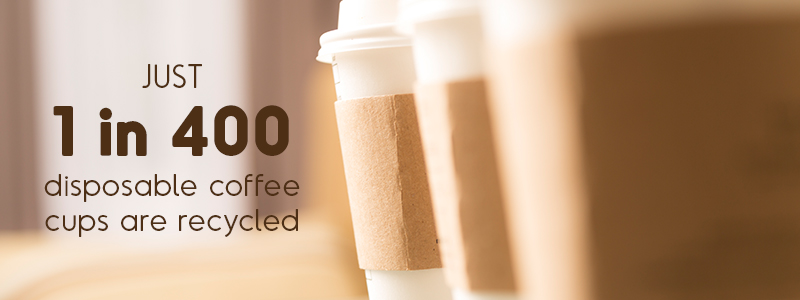How your beverage of choice might be bad for the Earth
Remembering a time when our streets weren’t littered with coffee shops is no doubt difficult for many of us. We might be known as a nation of tea drinkers, but we’re equally as crazy about getting our coffee fix – bringing fresh problems when it comes to coffee and the environment.
Both an indulgence and a pastime, the coffee craze has only grown over the last few decades, and according to the British Coffee Association we now drink nearly 55 million cups a day as a nation.
But whether you’re keeping yourself energised with coffee from the vending machine at work, or you’re hunched over a laptop in your nearest metropolitan cafe, there is a pressing issue surrounding our addiction to coffee: waste. The environment is on everyone’s lips, and rightly so, but how is our favourite hot beverage posing a challenge for homes and businesses alike?

How coffee creates troublesome waste
There are two main ways in which coffee creates waste, the first is through the packaging it comes in. Whether it’s the jar you get your instant grounds in or the disposable cup you have when you get a coffee on the go, the amount of packaging involved in such a popular product begins to create tricky issues when consumed on a large scale.
The second issue with coffee is the grounds. The increasing levels of coffee consumption means even more coffee grounds are being produced as a waste byproduct. While the amount of grounds may seem small when focusing on one home or office, the impact is intensified when you factor in thousands of homes and commercial premises.
Coffee and the environment: at home
If you’re especially dedicated to your coffee then you might not be able to wait until you reach the office for your fix. Many people have taken up the handy coffee machines which can be purchased to use at home, utilising small pods filled with different coffee strengths, flavours and origins.
This gives the consumer autonomy over how they have their coffee, but it also presents a real risk when it comes to the environment. The small pods used to package the coffee are made of a number of materials, making them hard to recycle. On top of this, they usually contain a residue which can be hard to clean, compounding the issue of recycling where the materials have to be cleaned to be put back into use.
Manufacturers have slowly begun to realise that even if a person only uses a single pod a day, spread across a year, and factoring in the thousands of homes which have these machines, the numbers begin to look toxic for the environment. It’s estimated 22% of homes have a coffee pod machine, all in the name of convenience.

Coffee and the environment: at work
The aforementioned coffee pods can often seem like a fun thing to take into work, but only recently the German government banned the use of coffee pods in government buildings because of how bad they are thought to be for the environment.
But packaging isn’t the biggest concern for companies looking to get high quality coffee for their workers. The grounds created in any real coffee machines will inevitably have to be emptied into the general waste, ensuring it ends up in landfill sites. If every office, warehouse and commercial premises empties their grounds into the bin, it would mean 500,000 tonnes of coffee grounds sitting in landfill in the UK each year.
There are currently schemes on the rise to help combat this issue though, with Bio-Bean leading the way in the recycling of used coffee grounds. Processing the grounds which they collect, Bio-Bean can turn this waste into fuel to be burnt, diverting the waste away from landfill and into energy production.
Another way in which commercial premises and offices can limit their waste is to select a machine which meets the requirements of their space. This means considering the capacity of their office, with smaller businesses requiring smaller machines and larger operations requiring a larger and more efficient machine. Every environment is different, meaning careful consideration should be taken to avoid waste and maximise the benefits.

Coffee and the environment: on the highstreet
With the number of coffee shops in the UK surpassing the 20,000 mark last year, it’s easy to see why it’s a billion pound industry. The big three chains make up the majority of those numbers, with branches across the country, but is our addiction to coffee on-the-go a detrimental one for the environment?
The answer, surprisingly, is yes. You may think that disposable coffee cups made of cardboard and plastic makes them easy to recycle, and while that’s true, it’s estimated less than one in 400 disposable cups ends up in recycling. One of the issues with these cups is that they require dedicated sorting and recycling, something many people aren’t aware of. One way in which some chains are attempting to combat this is through reusable cups, offering a discount to those who present them when purchasing their daily cup of joe.

Add to this the massive amounts of coffee grounds produced by chains as well as independents, and it’s clear that there are plenty of ways in which the industry could be greener. The Bio-Bean scheme is just one avenue, while some coffee shops give away their grounds to customers for use in their gardens.
Combating the way the nation’s favourite hot drink impacts on the environment is vitally important. At Nu Vending we provide detailed advice for those seeking the ultimate coffee vending solutions. No matter where you’re based, we’ll ensure you get the right machine to meet the needs of the people using it, simply get in touch for more details.




















